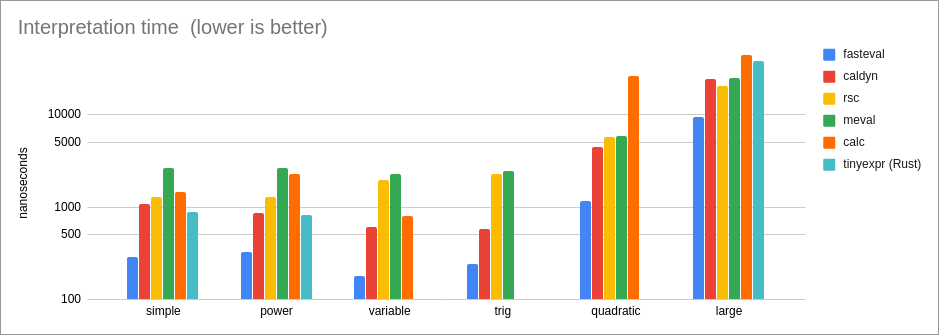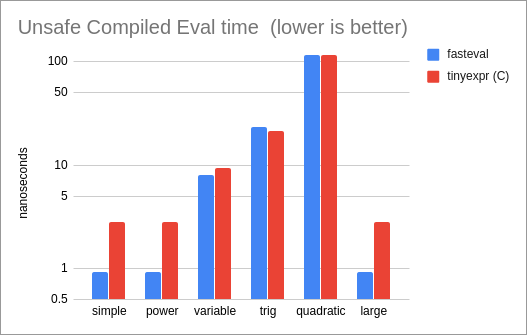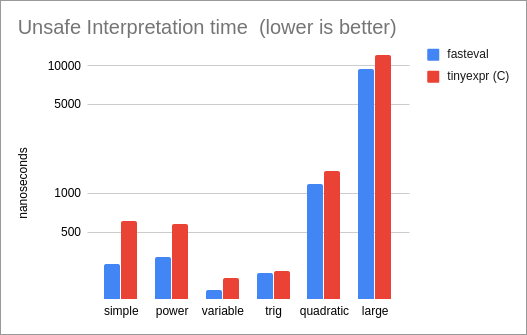Fast and safe evaluation of algebraic expressions
fasteval is a library for parsing, compiling, and evaluating algebraic expressions.
It can be used directly as a calculator language (much like python), and it is
an excellent foundation for building higher-level-languages.
Documentation:
Add this to your Cargo.toml:
[dependencies]
fasteval = "0.2.4"
You can use codegen-units=1 for better run-time performance. In some cases it will greatly improves LLVM's compile-time optimizations.
If you are using a 'nightly' Rust compiler, you can build with --features nightly to enable optimizations that aren't yet available in 'stable' Rust.
You can build with --no-default-features to disable alphabetical keywords like and, or, NaN, inf. (These words might be important to your applications.)
You can build with --features unsafe-vars to enable Unsafe Variables.
- No dependencies.
- Safe execution of untrusted expressions.
- Works with stable Rust.
- Supports interpretation (i.e. parse & eval) as well as compiled execution (i.e. parse, compile, eval).
- Supports Variables and Custom Functions.
fastevalis a good base for building higher-level languages.- Supports many built-in functions and constants.
- Supports all the standard algebraic unary and binary operators (+ - * / ^ %), as well as comparisons (< <= == != >= >) and logical operators (&& ||) with short-circuit support.
- Easy integration into many different types of applications, including scoped evaluation.
- Very fast performance.
Here is one simple example. See the API Reference for many more!
The ez_eval() function performs the entire allocation-parse-eval process
for you. It is slightly inefficient because it always allocates a
fresh Slab, but it is very simple to use:
fn main() -> Result<(), fasteval::Error> {
// This example doesn't use any variables, so just use an EmptyNamespace:
let mut ns = fasteval::EmptyNamespace;
let val = fasteval::ez_eval(
"1+2*3/4^5%6 + log(100K) + log(e(),100) + [3*(3-3)/3] + (2<3) && 1.23", &mut ns)?;
// | | | | | | | |
// | | | | | | | boolean logic with short-circuit support
// | | | | | | comparisons
// | | | | | square-brackets act like parenthesis
// | | | | built-in constants: e(), pi()
// | | | 'log' can take an optional first 'base' argument, defaults to 10
// | | numeric literal with suffix: p, n, µ, m, K, M, G, T
// | many built-in functions: print, int, ceil, floor, abs, sign, log, round, min, max, sin, asin, ...
// standard binary operators
assert_eq!(val, 1.23);
Ok(())
}github.com/likebike/fasteval$ rlwrap cargo run --release --example repl
Finished release [optimized] target(s) in 0.01s
Running `target/release/examples/repl`
>>> print("Hello fasteval", 1, 2, 3)
Hello fasteval 1 2 3
3
>>> _ + 1
4
>>> _ + 1
5
>>> _ * 2
10
>>> _ ^ 0.5
3.1622776601683795
>>> let a = 1
1
>>> let b = a + 1
2
>>> let c = a + b * 3
7
>>> a + b + c
10
>>> push
Entered scope[1]
>>> let b = b + 10
12
>>> a + b + c
20
>>> pop
Exited scope[1]
>>> a + b + c
10
>>> 1+2*3/4^5%6 + log(100K) + log(e(),100) + [3*(3-3)/3] + (2<3) && 1.23
1.23
>>> 1+2*3/4^5%6 + print("log(100K) =",log(100K)) + log(e(),100) + [3*(3-3)/3] + (2<3) && 1.23
log(100K) = 5
1.23
fasteval is designed to evaluate untrusted expressions safely. By
default, an expression can only perform math operations; there is no way
for it to access other types of operations (like network or filesystem or
external commands). Additionally, we guard against malicious expressions:
- Expressions that are too large (greater than 4KB).
- Expressions that are too-deeply nested (greater than 32 levels).
- Expressions with too many values (greater than 64).
- Expressions with too many sub-expressions (greater than 64).
All limits can be customized at parse time. If any limits are exceeded,
parse() will return an
Error.
Note that it is possible for you (the developer) to define custom functions which might perform dangerous operations. It is your responsibility to make sure that all custom functionality is safe.
Here is a short summary of the performance benchmarks. For a more complete report and anlysis, see the official documentation.
Note that the following charts use logarithmic scales. Therefore, tiny visual differences actually represent very significant performance differences.
Performance of evaluation of a compiled expression:

Performance of one-time interpretation (parse and eval):

Performance of compiled Unsafe Variables, compared to the tinyexpr C library (the
only other library in our test set that supports this mode):

Performance of interpreted Unsafe Variables, compared to the tinyexpr C library (the
only other library in our test set that supports this mode):

The impressive thing about these results is that fasteval consistently
achieves the fastest times across every benchmark and in every mode of
operation (interpreted, compiled, and unsafe). It's easy to create a
design to claim the #1 spot in any one of these metrics by sacrificing
performance in another, but it is difficult to create a design that can be
#1 across-the-board.
Because of the broad and robust performance advantages, fasteval is very
likely to be an excellent choice for your dynamic evaluation needs.
fasteval is distributed under the terms the MIT license.
See LICENSE for details.
